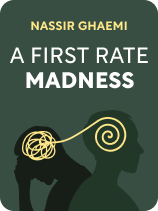

This article is an excerpt from the Shortform book guide to "A First Rate Madness" by Nassir Ghaemi. Shortform has the world's best summaries and analyses of books you should be reading.
Like this article? Sign up for a free trial here.
Are there any good manic behavior symptoms? How can leaders benefit from experiencing mania?
According to Nassir Ghaemi’s book A First-Rate Madness, mania and hyperthymia can make a leader uniquely prepared to tackle unprecedented challenges. These conditions can help leaders in two ways: by boosting their resilience to adversity and encouraging innovative thinking.
Keep reading to learn more about these manic behavior symptoms that help leaders in critical situations.
1) Mania Enhances Your Ability to Overcome Adversity
Ghaemi contends that one good manic behavior symptom is that it can enhance your ability to overcome adversity because it naturally elevates your mood and energy while decreasing anxiousness and self-doubt. This also applies to people with hyperthymic personalities who naturally have positive traits such as a sense of humor, enthusiasm, and open-mindedness, all of which combine to make a leader more capable of handling trying circumstances.
(Shortform note: While Ghaemi believes mania can help you overcome adversity and thus become more resilient, others have found that people with bipolar disorder often have lower levels of resilience. Whether or not you struggle with mental health issues, Brené Brown offers suggestions on how to improve your ability to overcome adversity. In The Gifts of Imperfection, she advises you to develop a hopeful way of thinking, challenge harmful social expectations, acknowledge your negative feelings, and practice spirituality.)
Additionally, beyond just mania, mental illness prepares leaders to overcome difficult challenges because mental illness is, itself, challenging to deal with. Struggling with any illness—whether physical or mental—can make you stronger and help you to overcome future hardships. In other words, a moderate amount of adversity makes you psychologically healthier than if you experience no adversity at all.
(Shortform note: In The Happiness Hypothesis, Jonathan Haidt argues that the timing of adverse experiences matters—experiencing difficulties at certain stages in your life can make you more resilient than when you experience them at other times. In particular, when you overcome adversity during your teenage and young adulthood years, you gain the most personal growth because you experience many important life changes then and tend to reflect on those years more.)
Example: Franklin D. Roosevelt, Polio, and the Great Depression
According to Ghaemi, Franklin Delano Roosevelt’s hyperthymic personality coupled with his battle with polio improved his resilience to adversity, allowing him to become an effective president during the Great Depression as well as World War II.
(Shortform note: During the two crises, Roosevelt found an innovative way to help the American people become more resilient themselves. He started the Fireside Chats, which was a series of around 30 radio speeches he made to the American public. During these broadcasts, he spoke informally, as though he were personally conversing with people by their fireplaces. By talking transparently about topics ranging from unemployment to US involvement in World War II, Roosevelt reassured and raised the confidence of Americans.)
Roosevelt showed many classic signs of having a hyperthymic personality: He was energetic, witty, and highly sociable. However, at age 39 he contracted polio, which left him paralyzed from the waist down. Yet despite his physical disability, Roosevelt was able to persevere in his political career because of his hyperthymic personality. According to Ghaemi, Roosevelt’s manic tendencies helped him grow psychologically stronger as he battled polio, leaving him wiser and more prepared to guide the nation through the economic depression and subsequent war
(Shortform note: Like Ghaemi, Doris Kearns Goodwin argues in Leadership in Turbulent Times that Roosevelt’s battle with polio improved his leadership abilities. However, while Ghaemi focuses on his ability to overcome adversity, Goodwin contends that Roosevelt’s contracting of polio allowed him to develop the necessary empathy to gain the trust of the American people and collaborate with his team to establish agencies and projects that would restore the nation’s economy.)
2) Mania Improves Innovative Thinking
In addition to helping leaders overcome adversity, mania can enhance a leader’s creativity, allowing them to generate innovative solutions to unprecedented challenges. Ghaemi defines creativity as the ability to both come up with inventive solutions and detect key problems that others fail to notice.
According to Ghaemi, symptoms of mania promote divergent and complex thinking, making people more aware of nuances that encourage new insights. This enhanced creativity allows leaders to break free from traditional approaches and to generate new solutions, both important when navigating unprecedented conflicts. Ghaemi argues that mentally well leaders, on the other hand, tend to be more confined to conventional strategies that are reliable for peacetime politics but disadvantageous during crises.
Example: General Sherman and the Civil War
In the 1860s, the American Civil War tested the leadership of Union Army General William T. Sherman. Ghaemi contends that General Sherman likely suffered from bipolar disorder, which gave him the innovative thinking skills needed to invent a new strategy of war that was instrumental to securing the Union victory.
Drawing from reports of the time, Ghaemi concludes that Sherman likely suffered from episodes of mania and depression. Ghaemi argues that these episodes allowed him to look beyond the traditional warfare tactics that involved direct confrontations between two armies. Instead, he realized the need to alter his approach, launching an innovative “total war” campaign to march through the South and target the region’s land and resources, resulting in the scorched-earth “March to the Sea” he’s remembered for.

———End of Preview———
Like what you just read? Read the rest of the world's best book summary and analysis of Nassir Ghaemi's "A First Rate Madness" at Shortform.
Here's what you'll find in our full A First Rate Madness summary:
- How mental illness can make someone a better leader
- How leaders like Churchill and Roosevelt benefited from mental illness
- The pitfalls of being a mentally well leader during a time of crisis






